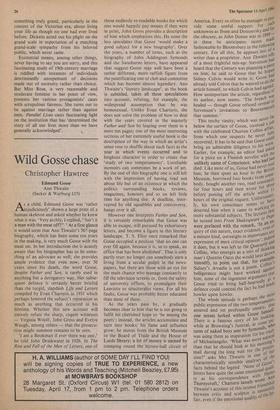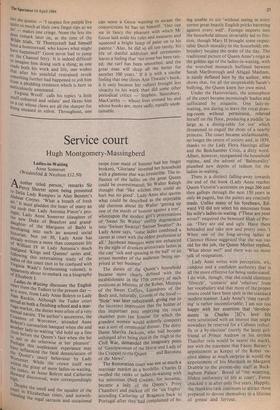Wild Gosse chase
Christopher Hawtree
Edmund Gosse Ann Thwaite (Seeker & Warburg £15) s a child, Edmund Gosse was 'rather
injudiciously' shown a large print of a human skeleton and asked whether he knew what it was. 'Very archly, I replied, "Isn't it a Man with the meat off?" ' At a first glance it would seem that Ann Thwaite's 567-page biography, which has been some ten years in the making, is very much Gosse with the meat on. In her introduction she is acutely aware that his biographer has to be some- thing of an advocate as well; she provides ample evidence that even now, over 50 years since his death, the word Gosse, despite Father and Son, is rarely used in anything but a derogatory way. Her subse- quent defence is certainly better briefed than the turgid, slapdash Life and Letters compiled by Evan Charteris in 1931 which perhaps lowered the subject's reputation as much as anything that occurred in his lifetime. Whether this new account will entirely refute the sharp, cogent witnesses — Virginia Woolf, John Gross and Evelyn Waugh, among others — that the prosecu- tion might summon remains to be seen.
'I am a Bookman if ever there was one,' he told John Drinkwater in 1926. In The Rise and Fall of the Man of Letters, one of those endlessly re-readable books for which one would happily pay money if they were in print, John Gross provides a description of him which emphasises this. He none the less speculates that Gosse 'would make a good subject for a new biography'. Over the years, a number of items, such as the biography of John Addington Symonds and the Swinburne letters, have appeared that suggest Gosse may well have been a rather different, more raffish figure from the pontificating one of club and committee which has become almost legendary. Ann Thwaite's 'literary landscape', as the book is subtitled, takes all these speculations into account, refuting, for example, the widespread assumption that he was homosexual. Unlike Evan Charteris, she does not solve the problem of how to deal with the years covered in the masterly Father and Son by leaping over them in a mere ten pages; one of the most interesting sections of her extremely useful book is the description of the way in which an artist's sense rose to shuffle about such facts as the year in which events occurred and to heighten character in order to create that 'study of two temperaments'. Unreliable memoirs can sometimes be a work of art. By the end of this biography one is still left with the impression of having read not about life but of an existence in which the politics surrounding books, reviews, magazines, honours and so on left little time for anything else. A deadline, inter- rupted by old squabbles and controversy, hangs over it all.
However one interprets Father and Son, it is certainly remarkable that Gosse was able to escape, still pursued by exhortatory letters, and become a figure in this literary landscape. T. S. Eliot once remarked that Gosse occupied a position 'that no one can ever fill again, because it is, so to speak, an office that has been abolished'. That is only partly true: no longer can somebody earn a living from a secular pulpit in the news- papers, but there are those with an eye for the main chance who manage constantly to fill the television screens or, from the safety of university offices, to promulgate their Leavisite or structuralist views. For all his faults, Gosse was probably better educated than most of these.
M the years pass by, it gradually becomes clear to him that he is not going to fulfil his cherished hope to 'be among the poets'; instead, the articles accumulate and turn into books; his fame and influence grow; he moves from the British Museum to the Board of Trade and the House of Lords library; a lot of money is earned by tramping round the lecture-hall circuit of
The Spectator 14 April 1984 America. Every so often he manages to pro" vide some useful support for such unknowns as Ibsen and Dostoevsky and for the obscure, as John Donne was in 1899:- in these he anticipates tastes made fashionable by Bloomsbury in the following century. For all this, he appears less of a writer than a proprietor. Ann Thwaite tells of a most frightful mix-up: Stevenson had heard that the Century was planning a Piece on him; he said to Gosse that he hoped Sidney Colvin would write it; Gosse had already told Colvin that he wanted to do the article himself, to which Colvin had agreed. How unimportant the article, regardless of its author, now seems. 'The breach viase healed — though Gosse refused several 01 Stevenson'sasnusmo.,invitations to Bournemouth that This tetchy vanity, which was never far below the surface of Gosse, received a id„" with the celebrated Churton Collins affair, from which one suspects he never fully recovered. It has to be said that Gosse coin bring an admirable diligence to his wok. Earlier, for example, an editor had ask fora a piece on a Flemish novelist with ,t,acet unlikely name of Conscience, who had P-A died. Like most of us, Gosse had never reati" him; he then spent an hour in the Brhis Museum, borrowed four books from some" body, bought another two, read constantly for four hours and then wrote for thr,cei before posting off the article within ' hours of the original request. Unfortunates ly, his own conscience seems to havrt deserted him when it came to working a, more substantial subjects. The lectures that he turned into From Shakespeare to pope were prefaced with the remark, 'In an el of quiry of this nature, exact evidence, even ., a minute kind, outweighs in importance any ci expression of mere critical opinion'; indee„d it does, but it was left to the QuartedY a", Collins, who emerges as a sort of think man's Quentin Oates (he would later drdvi.e, himself), to point out that, for exara,P ,s Sidney's Arcadia is not a poem. C°111"„sst belligerence might have worked agatt him; none of the ingenious arguments tnaa Gosse tried to bring half-heartedly asAe hdefence oerucpoounldhcoownlceera I the fact he had ma'
most
The whole episode is perhaps the apsusbulriecdexapnrdessyioetn opfrothroeutnwdolytemPeramerl'at uneasy, tilif. one senses lurked within Gosse him There is a famous story of his lookInp:. while at Browning's funeral, at some .:0 tures of naked boys sent by Symonds, was using them as inspiration for his stallYi of Michelangelo. 'What was more natar,as than that he should look at his morning mail during the long wait for the Prlier sion?' asks Mrs Thwaite in one . the characteristically sensible analyses 0' se,s facts behind the legend. 'None of 005,,h,. letters have quite the same emotional 0'10 ty as his correspondence with 143."0 Thornycroft,' Charteris lamely wrote. HA, nn account of this intense friend:try between critic and sculptor is enba" fair, even if the emotional quality of the ters she quotes — 'I suspect few people live quite so much at their own finger-tips as we d°' — makes one cringe. None the less she does remark later on at the time of the Wilde trials, 'If Thornycroft had himself been a homosexual, who knows what might have happened?' Gosse never had to jump or. the Channel ferry. It is indeed difficult to Imagine him doing such a thing; as one reads both his work and life, one wishes that after his youthful restrained revolt something further had happened to jolt him from a plodding existence which is here so Meticulously annotated. Virginia Woolf calls his topics 'a little snuff-coloured and sedate' and likens him to a cat whose claws are all the sharper for being encased in velvet. Throughout, one
can sense a Gosse wanting to escape the constrictions he has set himself. 'One can see in fancy the pleasure with which Mr Gosse laid aside his rules and measures and squeezed a bright lump of paint on to his palette.' Alas, he did so all too rarely; his life of dutiful addresses and ceremonies leaves a feeling that 'the stone has been rais- ed; the turf has been smoothed, and the great man will sleep all the better for another 100 years.' If it is with a similar feeling that one closes Ann Thwaite's book, it is only because her subject brought less vivacity to his work than did some other periodical critics — Stephen, Saintsbury, MacCarthy — whose lives crossed his and whose books are, more sadly, equally unob- tainable.











































 Previous page
Previous page